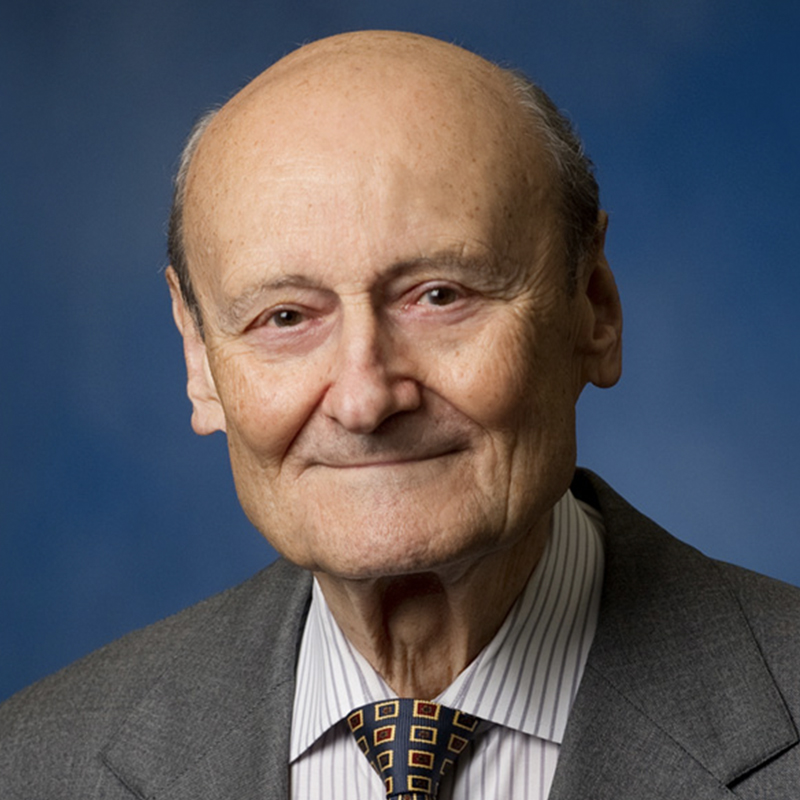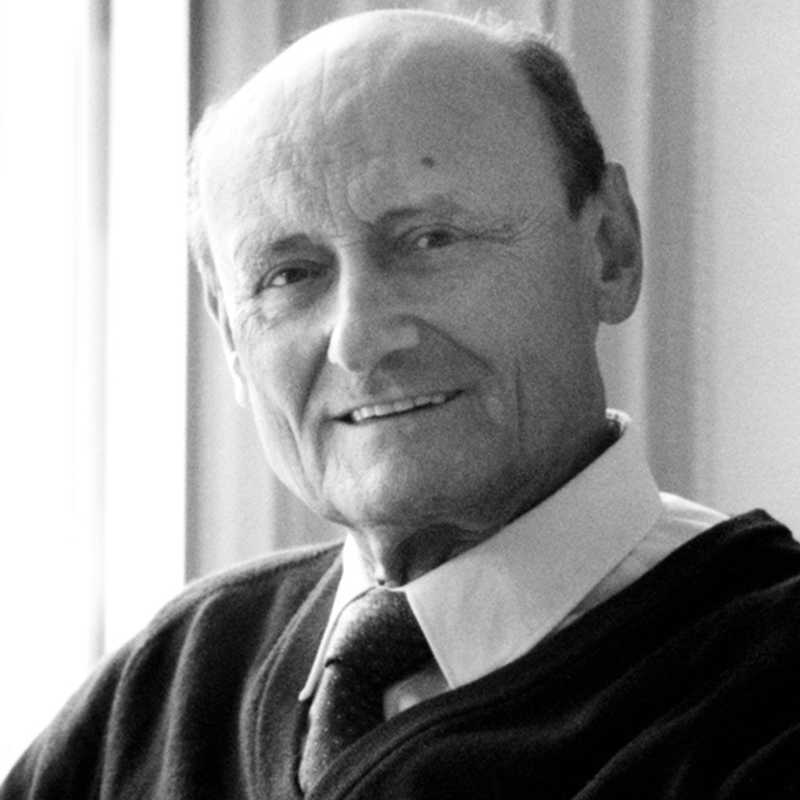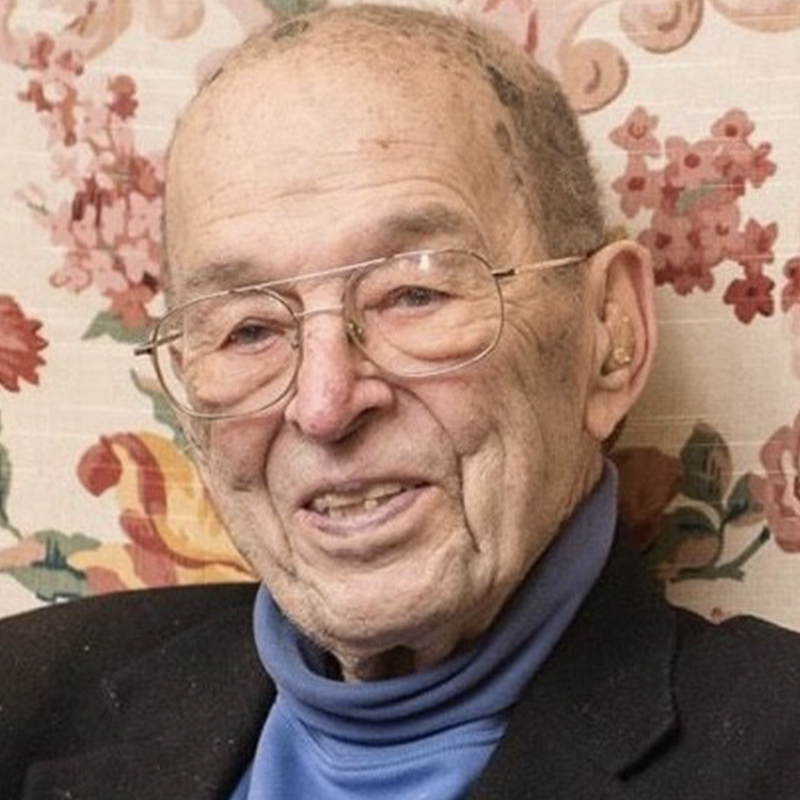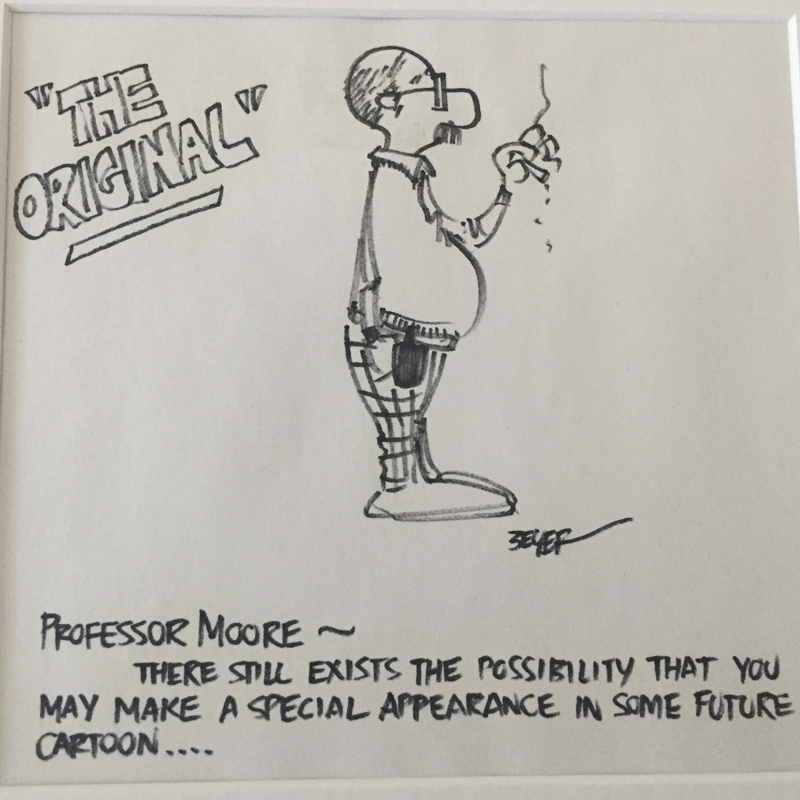In Memoriam
Egon Balas
University Professor of Industrial Administration and Applied Mathematics and Thomas Lord Professor of Operations Research, died on March 18, 2019. He was 96.
“A beloved member of the CMU faculty for more than half a century, Egon Balas was a preeminent and legendary scholar who was enormously influential in the fields of operations research and applied mathematics,” said Farnam Jahanian, president of Carnegie Mellon University. “Throughout his long and distinguished career as a researcher and teacher, he applied bold, focused and independent thinking to solve complex problems and also demonstrated a profound sense of humility, character and good humor. His extraordinary life and legacy will continue to serve as an inspiration to the entire CMU community.”
Balas was born into a Hungarian-Jewish family in Cluj, Romania, in 1922. After high school, he wanted to continue his studies in physics but was blocked by anti-Semitic laws. Determined to fight Nazism, he joined the underground Hungarian Communist Party and was arrested by Fascist Hungarian authorities in 1944. He was sentenced to 14 years of hard labor but escaped during transport to Germany. On his return home to Cluj, he found that all of his immediate family had been killed along with most Jews who lived in the town.
Still in the Communist Party, Balas taught himself economics and changed his birth name, Blatt, a common Jewish surname, to Balas in order to serve in the Romanian government as economics director in the Ministry of Foreign Affairs. During a power struggle in 1952, he was arrested by party leaders and put in solitary confinement for more than two years.
Released from prison in 1954, Balas became disenchanted with communism, especially after a trip with his wife, Edith, to the Soviet Union exposed economic conditions much worse than depicted in the state press. In a 2016 interview, Balas described the difficulty of his transition after spending decades trying to make economic sense of Marxism and socialism. But he also said this disillusionment helped spur his turn to mathematics. In 1959, at the age of 37, Balas immersed himself in the then-emerging field of linear programming, gaining recognition with a novel solution to a timber-harvesting problem. He called his solution the Additive Algorithm, similar to what is known as implicit numeration or constraint propagation today. He later earned Ph.D. degrees in economics (University of Brussels, 1967) and mathematics (University of Paris, 1968).
He was recruited to Carnegie Mellon in 1967, where he continued to develop new methods in the field of integer programming, in particular disjunctive programming. At CMU, he co-founded the Algorithms, Combinatorics and Optimization program, a joint Ph.D. program between the Mellon College of Science, Tepper School of Business and School of Computer Science.
In 1995, he earned the John von Neumann Prize from the Institute for Operations Research and the Management Sciences, which is considered the Nobel Prize of operations research. In 2001, he won the EURO Gold Medal, and in 2006, he was elected to the National Academy of Engineering and the IFORS Operational Research Hall of Fame.
Balas is survived by his wife of 70 years, Edith Balas, an emeritus professor of Art History at Carnegie Mellon; two children, Anna Balas and Vera Balas Koutsoyannis; three grandchildren; and four great-grandchildren.
Patsy J. “P.J.” McCarthy
Longtime office manager and administrative assistant to the heads of the Department of Mathematical Sciences, died on Sept. 27, 2019. She was 68.
For the last 34 years, which her family described as “very good years,” Patsy (P.J.) McCarthy could be found working at Carnegie Mellon, first in the College of Humanities & Social Sciences, then in the mathematical sciences department’s Wean Hall offices. She came to CMU from Westinghouse Research, where she worked until the company’s Harmar, Pennsylvania, offices closed.
Having come from a staid corporate environment, McCarthy had to adapt to the different world of academic management. She quickly made the transition and enjoyed the setting. Her adaptability was further demonstrated by her success in working with four different department heads, William Williams, Jim Greenberg, Nic Nicolaides and Tom Bohman, all of whom had greatly differing personalities and styles.
“Part of P.J.’s job was to execute directives by the department head, but on occasion she did not do that right away because she knew the department head should reconsider what he was doing. By consciously waiting, she gave him a chance to do this,” said Orion Hoch University Professor Steven. E. Shreve.
“I don’t think the heads ever knew that she did this intentionally. They were just relieved when they changed their mind to find out that she had not yet acted. An assistant like this is the most valuable kind.”
All agreed that she was indispensable to the department. During the transitions between department heads, McCarthy was credited with holding the department together.
“The secret of her success lay in a cheerful cynicism and great good humor,” said Professor Emeritus Williams.
McCarthy was an efficient and dedicated administrator who kept the department running smoothly for many years. She managed the department’s administrative staff. She was known for running a supportive workplace, with most staff under her supervision staying with the department for decades.
Her work contained numerous responsibilities, including managing correspondence, securing visas for new faculty, acting as a liaison to facilities management, coordinating documentation for the department’s advisory board report and much, much more.
In addition to her work with the department, McCarthy was a history buff and enjoyed being a pen pal through Pocket Pals.
McCarthy is survived by her husband of 42 years, Barry McCarthy.
Richard A. Moore
Professor of mathematics and former department head, died on Oct. 20, 2018. He was 94.
Born in Ohio in 1924, Moore grew up in Cleveland, New York City and St. Louis. After graduating from high school in 1942, he attended Yale University for one semester before joining the infantry to serve in World War II from 1943-45. After completing his service, he returned to Washington University where he earned his bachelor’s degree in 1948, master’s degree in 1950 and doctorate in 1953. He then served as an instructor at the University of Nebraska and at Yale.
Moore came to Carnegie Mellon, then called the Carnegie Institute of Technology, in September 1956 as an assistant professor of mathematics and remained with the department for the next 30 years until his retirement as a professor. He served two terms as associate department head and was department head from December 1971 to June 1975.
“The word that best described Dick was ‘affable,’” said Professor Emeritus William Williams. “He was always low key, unflappable and pragmatic in dealing with both faculty and students. An ideal associate department head, he always found the way to implement policy and procedure smoothly with minimal irritation to all parties.”
Moore was seen as an educational leader by the department, college and university. He planned most of the developments in the department’s undergraduate curriculum that happened during his tenure and was involved in curriculum planning at the university level.
He received the university’s William H. and Frances S. Ryan Award for Meritorious Teaching. In his nomination for this award, he was characterized as a “student’s professor,” referring to the extra commitment he gave to his students.
Moore also made significant contributions to graduate education at Carnegie Mellon, playing a key role in the development of the Doctor of Arts in Mathematics program, which was designed to prepare students to become teachers at the collegiate level.
As an administrator, he was known to efficiently handle the thankless details that kept the department running, such as scheduling classes, assigning instructors, advising students, supervising teaching assistants and coordinating with the rest of the university.
His commitment to education reached beyond Carnegie Mellon. He consulted with local school districts and area colleges and represented the university to groups such as the Mathematical Association of America, the National Council of Teachers of Mathematics, the Pennsylvania Council of Teachers of Mathematics and Mathematics Council of Western Pennsylvania.
In 1995, the Mellon College of Science established the Richard Moore Education Award to recognize faculty for their substantial and sustained contributions to the educational mission of the college.
Moore is survived by his wife of 69 years, Ruth Neuhoff Moore; three children, Peter A. Moore, Susan Moore McJunkin and Sarah M. Moore; four granddaughters; and six great grandchildren.





